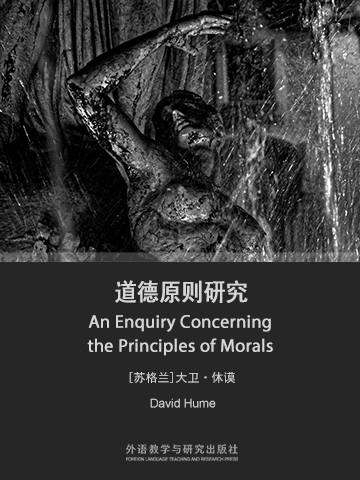人类行为皆源于自私?善恶标准皆因社会效用?休谟:我反对。
An Enquiry Concerning the Principles of Morals (EPM) is a book by Scottish enlightenment philosopher David Hume. In it, Hume argues (among other things) that the foundations of morals lie with sentiment, not reason.
This book is the enquiry subsequent to the Enquiry Concerning Human Understanding (EHU). Thus, it is often referred to as "the second Enquiry". It was originally published in 1751, three years after the first Enquiry. Hume first discusses ethics in A Treatise of Human Nature (in Book 3 - "Of Morals"). He later extracted and expounded upon the ideas he proposed there in his second Enquiry. In his short autobiographical work, My Own Life (1776), Hume states that his second Enquiry is "of all my writings, historical, philosophical, or literary, incomparably the best."
《道德哲学研究》明确地讨论了伦理学的主要问题,以清晰、严谨的形式进行了道德分析。休谟认为,道德研究的目的是发现道德赞美和道德遣责赖以存在的一般原则;善或恶之所以得到赞许或遣责,部分是由于人的同情,部分是由于其社会效用;效用说明了仁爱、正直、友谊、诚实之类美德的价值。作者主张一切人类行为源于自私的理论是错误的;凡有价值的东西,或是由于有效用,或是因为它适意。
An Enquiry Concerning the Principles of Morals (EPM) is a book by Scottish enlightenment philosopher David Hume. In it, Hume argues (among other things) that the foundations of morals lie with sentiment, not reason.
This book is the enquiry subsequent to the Enquiry Concerning Human Understanding (EHU). Thus, it is often referred to as "the second Enquiry". It was originally published in 1751, three years after the first Enquiry. Hume first discusses ethics in A Treatise of Human Nature (in Book 3 - "Of Morals"). He later extracted and expounded upon the ideas he proposed there in his second Enquiry. In his short autobiographical work, My Own Life (1776), Hume states that his second Enquiry is "of all my writings, historical, philosophical, or literary, incomparably the best."
- AUTHOR’S ADVERTISEMENT.
- SECTION II. OF BENEVOLENCE.
- SECTION III. OF JUSTICE.
- SECTION IV. OF POLITICAL SOCIETY.
- SECTION V. WHY UTILITY PLEASES.
- SECTION VI. OF QUALITIES USEFUL TO OURSELVES.
- SECTION VII. OF QUALITIES IMMEDIATELY AGREEABLE TO OURSELVES.
- SECTION VIII. OF QUALITIES IMMEDIATELY AGREEABLE TO OTHERS.
- SECTION IX. CONCLUSION.
- APPENDIX I. CONCERNING MORAL SENTIMENT
- APPENDIX II. OF SELF-LOVE.
- APPENDIX III. SOME FARTHER CONSIDERATIONS WITH REGARD TO JUSTICE.
- APPENDIX IV. OF SOME VERBAL DISPUTES.
- 书评 写书评
- 笔记
-
书评加载中...





















 京公网安备 11010802032529号
京公网安备 11010802032529号
笔记加载中...